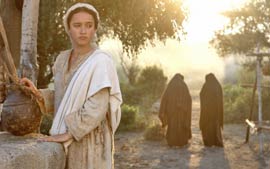 11 de janeiro de 2007
11 de janeiro de 2007

If God is good, why does he permit so much evil to fill the world? This was asked by John Denver in the movie Oh God! and by millions of other people during their lifetime. George Burns, in the role of God, answered: “I don’t permit it. You do!” Pope John Paul II asked last March: “How can this [Easter] message of joy and hope be made to resound when many parts of the world are submerged in sorrow and tears? How can we speak of peace, when people are forced to flee, when they are hunted down and their home are burnt to the ground?”
In examining the contradiction of evil and hope, Susan Ross affirms: “The naming of the evil in human existence is itself a moral task. What we identify as evil we are morally obligated to respond to.” We have an ability to respond to evil in any form. That ability Ross finds in the assessment of a moral situation and the capacity to “voice” a confrontal stance. She finds it also in “mutuality,” a relationship founded in ¿a vision of Christian community as one of Justice¿ and equality. Ross suggests “that the disturbing message of the cross is precisely where contemporary theology needs to look … when we consider the question of evil.” Bits of hope can be found in the words of the dying Savior as well in the image of the three Marys and John as they watched their tortured one die. Their wordless presence gave witness to their faith in God and trust that evil would not have the last word.
The power to confront and try to transform the people and institutions which promote or profit by suffering and evil, she says, quoting Marjorie Suchocki, is found in forgiveness. This is “an alternative response to violence that has the power to break the cycle.” Forgiveness, then, has ¿three dimensions: 1) willing the well-being of the victim and violator; 2) acknow-ledging the relation of victim and violator; and 3) knowing and remembering. Remembering for the forgiver is to transform; for the vengeful, it is to destroy.
The Christian tradition must find hope, even in overwhelming suffering and evil. Paul says God turns everything to our good. Billy Graham sees world evil as a consequence of a battle over the Earth between the angelic armies. The Pope affirmed: “Peace is possible, peace is a duty, peace is a prime responsibility for everyone!”1 Jesus said: “Peace I leave you, my peace I give you, a peace the world cannot give, this is my gift to you.” If peace doesn’t fill the world it is because people don’t know how to receive it. It takes the hope found in martyrs, willing to even lay down their lives in the conflict with evil, so that others may reap peace and justice.
RESUMO: idéias principais do texto – DESESPERO x ESPERANÇA
Se Deus é bom por que Ele permite tanto mal encher o mundo?
Essa pergunta é feita por John Denver no filme Oh! Deus e por milhões de pessoas. George Burns, no papel de Deus respondeu, “Eu não o permito. Vocês sim!” O papa João Paulo II perguntou como essa mensagem de alegria e esperança pode ressoar enquanto muitas partes do mundo estão submersas em tristezas e lágrimas. Como podemos falar em paz?
Examinando a contradição entre o mal e esperança, Suzan Ross diz: ” o mal na existência humana é uma dimensão moral. O que identificamos como mal somos moralmente obrigados a enfrentar” Temos habilidades de enfrentá-lo de qualquer forma. Há relação desse enfrentamento do mal no cristianismo com a justiça e a igualdade. Ross sugere que a mensagem distorcida da cruz é justamente onde a Teologia precisa estar atenta, onde consideramos a questão do mal.
Pedaços de esperança podem ser achados nas palavras do salvador morrendo, assim como na imagem das 3 Marias e de João onde viam seu torturado morrer.
Sua presença sem palavras deu testemunho para sua fé em Deus e acreditar que o mal não teria a última palavra. O poder de confrontar e tentar transformar as pessoas e instituições que promovem o sofrimento e o mal é achado no perdão. Essa é uma resposta alternativa à violência que tem o poder de quebrar o ciclo.
Perdão então tem 3 dimensões:
1. desejar o bem para a vítima e o violador;
2. entender a relação entre os dois;
3. saber e lembrar
Lembrar que o perdão é transformador e o não perdoar destrói. A tradição cristã precisa achar esperança mesmo no sofrimento e mal. Paulo diz que Deus transformou tudo para o nosso bem. Billy Graham vê o mundo do mal como uma consequência da batalha entre a terra e os anjos.O papa afirma: a paz é um dever. A paz é uma responsabilidade básica de todo Cristão.
Jesus diz: Paz eu vos deixo. Minha paz eu vo-la dou. A paz que o mundo não pode dar. Esse é o meu presente para vocês. Se a paz não preenche o mundo é porque as pessoas não sabem como recebê-la. Nós vemos isso na esperança dos mártires que deram suas vidas no conflito do mal, para que assim as outras pessoas pudessem ter paz e justiça.
(Tradução por CauReb)


